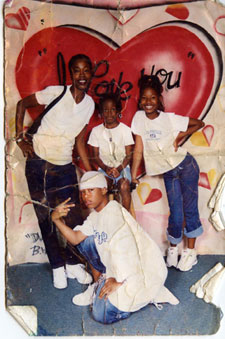Dreams Deferred: The Sakia Gunn Film Project
Reel Affirmations 2008
Review by Yusef Najafi
Rating: 
 (2 out of 5)
(2 out of 5)
Saturday, 10/18/2008, 5:00 PM
Feature presentation, $0 at Goethe Institut Inter Nationes

WHO WAS SAKIA Gunn? That’s the question Charles Bennett Brack’s documentary asks of several people during the opening scenes of Dreams Deferred: The Sakia Gunn Film Project. He then fills the viewer in on who she was: A 15-year-old Newark, N.J., lesbian, who was stabbed to death on May 11, 2003, following a night out at Greenwich Village. Gunn and her friends had turned down the advances of two men while waiting for the bus, telling them they were lesbians. The two men got out of their car and began to attack the girls. Gunn was stabbed, and bled to death in her cousin’s arms.
Brack uses Gunn’s murder as a stepping stone to draw attention to the outrage many African-American GLBT people from Newark felt about the lack of media coverage and national outcry regarding the woman’s death. One year after the incident, a candlelight vigil and ”speak out” organized at the same location captured that frustration and motivation to make a difference in the neighborhood.

Corey Booker, mayor of Newark, reminds vigil participants that it wasn’t a random act of violence that killed Sakia. ”This person hunted Sakia down because she was gay,” he says. ”Today we remember that after her death, there was not a national outcry like there was for the white male Matthew Shepard.”
There are moments where the documentary encounters problems, the first of which occurring a few minutes in as the filmmaker attempts to describe Sakia’s attack. Peter Wong, of the Harvey Milk LGBT Democratic Club, is seen in San Francisco on a sunny day, yelling with a heavy accent details of Gunn’s death as Brack overlays images of the courtroom and the dark intersection in Newark where Gunn was killed. This jumbled clash of sounds and images creates a major disconnect that’s difficult to overcome. Unfortunately, it’s not the last time Brack utilizes such an approach. Moreover, there’s no flow from one scene to another. At most, the photographs featured in the film do the deed, but they’re not enough to keep the viewer engaged and invested in a story about a teenager’s murder and how it changed the neighborhood in which she lived.
Support Metro Weekly’s Journalism
These are challenging times for news organizations. And yet it’s crucial we stay active and provide vital resources and information to both our local readers and the world. So won’t you please take a moment and consider supporting Metro Weekly with a membership? For as little as $5 a month, you can help ensure Metro Weekly magazine and MetroWeekly.com remain free, viable resources as we provide the best, most diverse, culturally-resonant LGBTQ coverage in both the D.C. region and around the world. Memberships come with exclusive perks and discounts, your own personal digital delivery of each week’s magazine (and an archive), access to our Member's Lounge when it launches this fall, and exclusive members-only items like Metro Weekly Membership Mugs and Tote Bags! Check out all our membership levels here and please join us today!



























